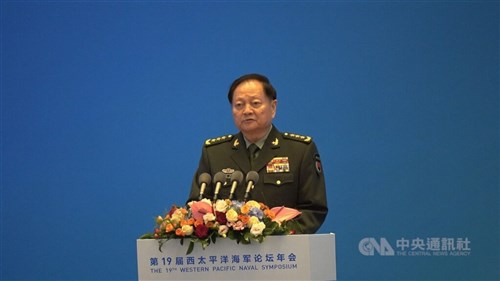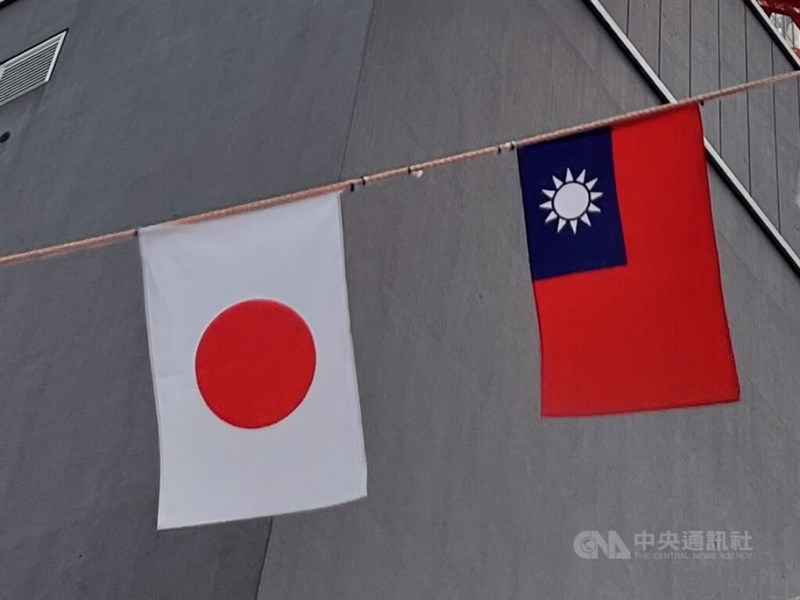ANALYSIS/Taiwan should focus on PLA precision strikes, carrier operations: Scholars
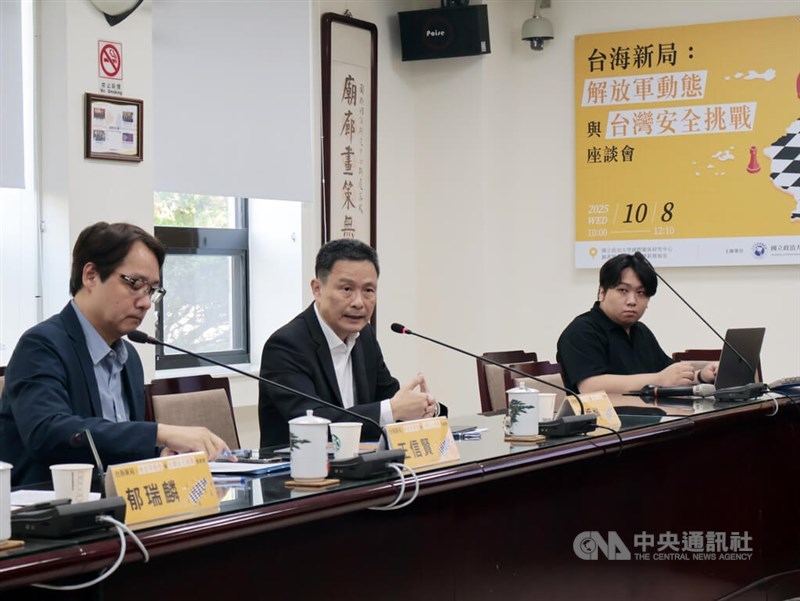
Taipei, Oct. 8 (CNA) Taiwanese military scholars on Wednesday discussed recent moves by the Chinese People's Liberation Army (PLA), including increased bomber activity in the Taiwan Strait and fewer aircraft operating east of Taiwan, saying Taiwan needs to be better prepared for precision strikes and aircraft carrier operations.
Once the PLA's bomber-centric operations capability has matured, it will be able to carry out "one-off, controlled, surgical" strikes on specific targets in Taiwan without harming civilians, said Ma Chen-kun (馬振坤), a professor at National Defense University's Graduate Institute of China Military Affairs Studies.
Speaking at a Taipei seminar hosted by National Chengchi University's Institute of International Relations on PLA movements and their implications for Taiwan's security, Ma made the remarks after noting a recent increase in PLA H-6 bomber activity in the Taiwan Strait.
The medium to long-range strike bomber was spotted in the Taiwan Strait on as many as 14 days in September, he said.
"In the past, H-6 bombers typically appeared in Taiwan's southwestern airspace, then transited the Bashi Channel [a waterway between Taiwan and the Philippines], as their intended targets were Guam or U.S. naval vessels in the Western Pacific," Ma said, indicating a shift in approach since September.
The H-6 series bombers can carry not only standard munitions but also supersonic and even hypersonic land-attack missiles, as well as anti-ship missiles, according to Ma.
It could thus conduct a one-off precision strike against Taiwan's west coast, especially in the center of Taipei, without harming civilians, Ma said.
Why pursue precision strikes?
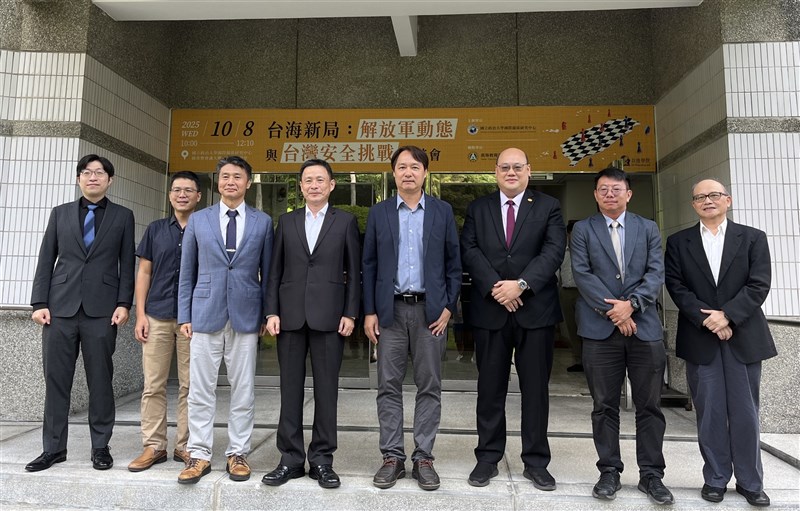
As for the rationale for the PLA to conduct precision strikes, Ma said the primary objectives are to minimize the strike footprint and bring the conflict to a quick end.
"Based on all publicly available information, we can infer that, on the political front, [Chinese President] Xi Jinping (習近平) currently has no intention of using military means to resolve the Taiwan issue," Ma said, referring to Beijing's long-stated aim of achieving unification with Taiwan.
"However, clues from various aspects of military preparations suggest he [referring to Xi] does believe it may be necessary to take military action when required, to deter what Beijing calls 'Taiwan independence' separatist activities," Ma added.
The military expert said a similar precision strike occurred on Sept. 9, when Israel carried out a targeted attack in Doha, Qatar, aimed at senior political leaders of Hamas involved in negotiations for a ceasefire in Gaza, resulting in six deaths and at least four injuries.
Ma said the Trump administration, in response to Israel's strike in Qatar -- both diplomatic allies of the United States -- confined itself to reaffirming Washington's commitment to Qatar's security, without taking any further action.
If China were to conduct a one-off strike against Taiwan similar to Israel's strike in Qatar with no follow-up military action, "how we should respond with military countermeasures becomes a key question," Ma noted.
Warning Taiwan to maintain constant vigilance against potential decapitation strikes on specific targets, he added that any Taiwanese military action after such a one-off PLA attack "would signal an escalation of the overall cross-strait situation,"
"Another issue that warrants careful assessment is whether the U.S. would respond with military action [on Taiwan's behalf,]" Ma added.
Fewer PLA planes east of Taiwan
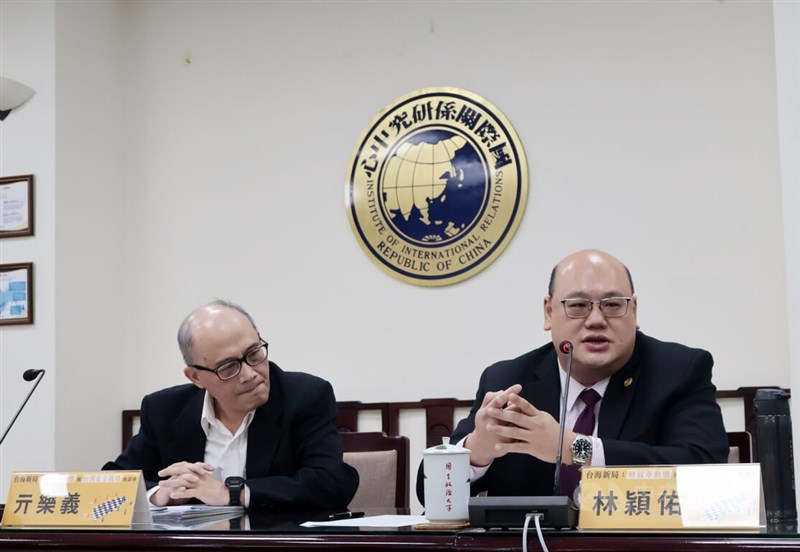
Also attending the seminar, Lin Ying-yu (林穎佑), an associate professor at Tamkang University's Graduate Institute of International Affairs and Strategic Studies, said that recently fewer PLA aircraft have been seen flying east of Taiwan.
"It is no longer just about threats from the air," Lin said, adding that if the PLA were to employ sea power to establish a presence or conduct patrols off Taiwan's east coast, it could likewise exert pressure.
"In the past it may have relied on quantity, but it is now shifting to a quality-driven threat," Lin said. "Beyond the air and the sea, we should not forget aircraft carriers."
The PLA currently has three aircraft carriers, and all three have been near Taiwan. The Liaoning and Shandong have operated in waters close to the island country, while the yet-to-be-commissioned Fujian transited the Taiwan Strait in September.
Echoing Lin, Chen Kuo-ming (陳國銘), editor-in-chief of Defence International magazine, noted that the threat from surface ships is greater than that from aircraft because "you can't chase those surface vessels away."
The military expert said aircraft face flight-time limits, noting that a bomber on a long sortie might remain aloft for about 10 hours.
"But warships are harder to handle, as they can loiter within the 24 nautical miles [of the coast], even inside your contiguous zone, running back-and-forth grid patrols." Chen added.
![Xi's military purge raises Taiwan miscalculation risk: Experts]() Xi's military purge raises Taiwan miscalculation risk: ExpertsChinese President Xi Jinping's (習近平) ongoing purge of senior military leaders, most recently targeting top general Zhang Youxia (張又俠), could help him consolidate power and potentially increase the risk of strategic miscalculation over Taiwan, according to experts.01/27/2026 09:31 PM
Xi's military purge raises Taiwan miscalculation risk: ExpertsChinese President Xi Jinping's (習近平) ongoing purge of senior military leaders, most recently targeting top general Zhang Youxia (張又俠), could help him consolidate power and potentially increase the risk of strategic miscalculation over Taiwan, according to experts.01/27/2026 09:31 PM![Japan vote a 'high-stakes gamble' of importance to Taiwan: Experts]() Japan vote a 'high-stakes gamble' of importance to Taiwan: ExpertsWidely seen as the most Taiwan-friendly Japanese prime minister since Shinzo Abe, Sakae Takaichi dissolved the House of Representatives on Friday three months after taking office, setting the stage for a snap election on Feb. 8 as she attempts to consolidate her leadership.01/24/2026 05:55 PM
Japan vote a 'high-stakes gamble' of importance to Taiwan: ExpertsWidely seen as the most Taiwan-friendly Japanese prime minister since Shinzo Abe, Sakae Takaichi dissolved the House of Representatives on Friday three months after taking office, setting the stage for a snap election on Feb. 8 as she attempts to consolidate her leadership.01/24/2026 05:55 PM![Not time to worry about TSMC's reported expansion in U.S.: Experts]() Not time to worry about TSMC's reported expansion in U.S.: ExpertsSpeculation surrounding Taiwan Semiconductor Manufacturing Co.'s (TSMC) potential expansion in the United States should not be overinterpreted, as structural and economic constraints mean such moves are unlikely to weaken Taiwan's central role in advanced chipmaking in the near future, experts said.01/15/2026 08:19 PM
Not time to worry about TSMC's reported expansion in U.S.: ExpertsSpeculation surrounding Taiwan Semiconductor Manufacturing Co.'s (TSMC) potential expansion in the United States should not be overinterpreted, as structural and economic constraints mean such moves are unlikely to weaken Taiwan's central role in advanced chipmaking in the near future, experts said.01/15/2026 08:19 PM
- Business
U.S. dollar up in Taipei trading
01/30/2026 10:21 AM - Society
Taiwan headline news
01/30/2026 09:50 AM - Culture
Taiwan Talent Office helps foreigners navigate new work, residency rules
01/30/2026 09:46 AM - Business
Taiwan shares open higher
01/30/2026 09:10 AM - Cross-Strait
Taiwan takes prudent stance after China probes top general Zhang Youxia
01/29/2026 09:32 PM
